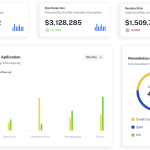Discover the significance of data classification and how it can benefit your business.
Understanding the Basics of Data Classification
Data classification is the process of categorizing data based on its characteristics, such as its content, sensitivity, or importance. By understanding the basics of data classification, businesses can effectively manage and protect their data assets.
One of the main reasons why data classification is important is because it helps businesses identify and prioritize their data. By categorizing data into different levels of sensitivity or importance, businesses can allocate resources and implement appropriate security measures to protect their most valuable information.
Data classification also enables businesses to effectively control access to their data. By classifying data, businesses can determine who should have access to certain information and implement appropriate access controls. This helps prevent unauthorized access and reduces the risk of data breaches.
Furthermore, data classification enhances data organization and accessibility. By categorizing data, businesses can easily locate and retrieve information when needed. This improves operational efficiency and streamlines data management processes.
Another benefit of data classification is that it helps businesses streamline decision-making processes. By categorizing data based on its relevance or importance to certain business activities, businesses can make more informed decisions and prioritize their resources accordingly.
Lastly, data classification is essential for ensuring regulatory compliance. Many industries have specific data protection regulations that businesses must adhere to. By classifying data, businesses can ensure they are meeting regulatory requirements and avoid potential penalties or legal issues.
In conclusion, data classification is crucial for businesses as it enables them to understand and protect their data, enhance data organization and accessibility, streamline decision-making processes, and ensure regulatory compliance.
Protecting Sensitive Information
One of the key aspects of data classification is protecting sensitive information. Sensitive information includes personally identifiable information (PII), financial data, intellectual property, and any other confidential or classified data.
By classifying sensitive information, businesses can implement appropriate security measures to protect it from unauthorized access or disclosure. This may include encryption, access controls, data loss prevention systems, and employee training on data handling best practices.
Protecting sensitive information is crucial for maintaining customer trust and complying with data protection regulations. Data breaches can result in financial loss, reputational damage, and legal consequences for businesses.
By effectively classifying and protecting sensitive information, businesses can mitigate the risk of data breaches and ensure the confidentiality, integrity, and availability of their data assets.
Enhancing Data Organization and Accessibility
Data classification plays a crucial role in enhancing data organization and accessibility. By categorizing data based on its characteristics, businesses can create a structured and organized data environment.
This allows for easier data retrieval and improves operational efficiency. Instead of spending valuable time searching for specific information, employees can quickly locate the data they need and focus on their tasks.
Furthermore, data classification enables businesses to implement effective data management strategies. By understanding the importance and value of different data types, businesses can allocate resources effectively and prioritize data storage and backup.
Enhanced data organization and accessibility also contribute to better collaboration and decision-making processes. When data is well-organized and easily accessible, teams can work together more efficiently and make informed decisions based on accurate and up-to-date information.
Streamlining Decision-Making Processes
Data classification plays a vital role in streamlining decision-making processes within businesses. By categorizing data based on its relevance or importance to specific business activities, decision-makers can prioritize their resources and make more informed decisions.
For example, by classifying sales data based on customer demographics, businesses can identify key target markets and allocate marketing resources accordingly. This helps optimize marketing strategies and improve return on investment.
Data classification also enables businesses to identify trends and patterns in their data, which can inform strategic decision-making. By analyzing classified data, businesses can gain valuable insights into customer behavior, market trends, and industry dynamics.
By streamlining decision-making processes through data classification, businesses can make more accurate and timely decisions, leading to improved business outcomes and competitive advantage.
Ensuring Regulatory Compliance
Data classification is essential for ensuring regulatory compliance, especially in industries with specific data protection regulations. By categorizing data based on its sensitivity or importance, businesses can ensure they are meeting regulatory requirements and avoid potential penalties or legal issues.
For example, industries such as healthcare, finance, and telecommunications have strict regulations regarding the protection of sensitive customer data. By classifying data and implementing appropriate security measures, businesses in these industries can demonstrate compliance with regulations such as HIPAA, GDPR, or PCI DSS.
Ensuring regulatory compliance not only helps businesses avoid legal consequences but also builds trust with customers. Customers are more likely to engage with businesses that prioritize data protection and comply with industry regulations.
By effectively classifying data and implementing necessary controls, businesses can maintain regulatory compliance, protect their reputation, and build strong relationships with customers and stakeholders.



